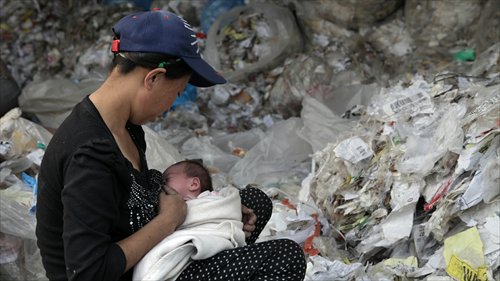HOME >> CHINA
Filmmaker focuses on pollution caused by overseas waste
By Liang Chen Source:Global Times Published: 2015-1-30 5:03:01

A woman breast-feeds her baby.
Freelance filmmaker Wang Jiuliang can best be described as an idealist.Over the past seven years, Wang has dedicated himself to two things: spending three years taking photos showing the garbage that besieged the capital city Beijing, and making a documentary on pollution in vast areas of China caused by plastic waste from overseas, titled Plastic China, for the past three years.
The documentary is scheduled to be released this June. The 12-minute trailer has already gone viral on the Internet, drawing huge media attention and public concern.
Wang is a controversial figure. His photos confronted viewers with the dark side of China's economic development: mounting heaps of rubbish and vast piles of plastic.
His exhibition and documentary touched on topics so sensitive that none could achieve commercial success. Sometimes, he had to borrow money from friends to support the projects.
However, he said he has no regrets, as money was never his ultimate goal, while his obsessive pursuit of photography has helped him find meaning in life.
"I am an idealist. This has never changed and will never change," 39-year-old Wang, who is currently a visiting scholar in UC Berkeley, told the Global Times.

Filmmaker Wang Jiuliang Photo: Courtesy of Wang Jiuliang
Plastic kingdomWhen Wang was doing his research in the US, he found that each day, a large amount of plastic was shipped out from the rubbish disposal center in Berkeley. The manager told him that most of it would be shipped to China, as Chinese buyers were willing to pay more than twice the normal price for the material.
China is the world's largest garbage importer.
Wang, who has long been concerned about environmental issues, decided to find out how plastic enters China from overseas and how badly they pollute the country.
In pursuing the case, Wang travelled to several plastic disposal centers in several parts of China, and discovered that the materials had a disastrous effect on the environment and people's health in the coastal regions.
"In the Northeast, North, East and South China, almost every province in the coastal region has concentrated plastic disposal industries, and some small home factories scattered around different areas. This was an industrial problem," Wang said.
Most of China's plastics disposal centers adopt an extensive management system, as improper disposal of plastics can lead to severe consequences. The chemical substances, heavy metals and toxic gases produced in the disposal process can harm people and pollute the environment.
In the trailer, most of the factory workers, who tended to be middle-aged women, wore masks and rubber gloves only when sorting and processing the plastics. Some people's fingers became deformed due to the long-term exposure to the poisonous plastics.
The influence on the environment was huge. In many places, people have to buy bottled water to drink because the underground water was no longer fit for consumption. The air smelled bad, while the water and farmlands were heavily polluted.
When shooting his film, Wang was often obstructed by the local authorities, who sometimes detained and interrogated him. But the most shocking thing was people's indifference to the problem.
In his documentary, children were seen filling discarded syringes with water and squirting it directly into their mouths for fun.
"The most painful thing is that parents were so numb to the pollution. They would obstruct me when they found out my documentary might anger local authorities, who might then take action against them," Wang said.
Money was also a problem for the documentary. The project was prolonged for months and money ran out quickly. In the end, Wang had to find sponsors to complete the documentary.
Wang said he worked on screening the documentary in the US. He hoped that by screening the show, the problem could be solved at its source. "I hope I can put some pressure on the countries exporting the plastics, urging them to dispose of and process the plastics within their own territory," Wang said.
Wang's persistence in pursuing his artistic expression and his devotion to environmental issues was impressive. "Wang is the kind of youngster who purely pursues his ideals. His works sharply confront social problems, inspiring people to think," Bao Kun, a renowned Beijing-based artist, said.
Wang's work is not without controversy. Some comments online have accused Wang of trying to become famous by exposing the dark side of China's economic boom.
Under siege
Wang, born in 1976 in Anqiu, East China's Shandong Province, became enthusiastic about environmental protection issues due to his nostalgia for a pure and clean countryside.
After graduating from Communication University of China and working as a freelance filmmaker, he once returned to Shandong, looking for a clean environment for one of his photography series in 2008.
At that time, he wanted to find primitive, unpolluted countryside.
However, when he returned, he found his hometown had changed. "Daily waste, plastics, and pesticide bottles were everywhere. They were dismantling village life," Wang said.
He longed for the hometown of his childhood. He wanted to find out how the rubbish polluted the environment.
In 2008, Wang, who then lived in a suburb of Beijing, started his investigation into garbage pollution surrounding Beijing.
From 2010 to 2011, Wang travelled by motorcycle to almost all the 450 garbage dumps and landfills encircling the capital. He took over 5,000 photos and held an exhibition to expose the shocking situation of the landfills.
He found that waste water ran all over the place and the entire area stank. People who lived nearby were ignorant about the effect it had on their health.
To help people understand what was going on, Wang marked the location of each garbage dump on a map. "The local authorities should mark the locations for garbage dumps on maps and make them public," Wang said.
The photographs drew such a huge amount of attention that the central government ordered Beijing authorities to deal with the problem. In April 2011, Beijing authorities vowed to invest over 10 billion yuan to manage the garbage landfills.
Although his works were highly acclaimed, he went into debt from taking photos of these garbage dumps. He personally invested 300,000 yuan in the project, and loans from friends
Wang never pursued profit. Most of his photographs cannot be sold to galleries, due to the sensitivity of the topic. He relied mainly on sponsorship from artistic organizations and prize money from photography awards for his living.
Photography companies used to offer him work opportunities, but he refused. "I like a free working atmosphere. I don't want my thoughts to be contained," Wang said.
Newspaper headline: Taking out the trash
Posted in: Profile